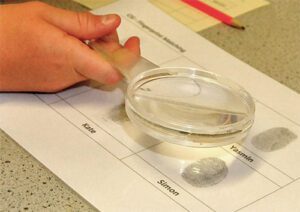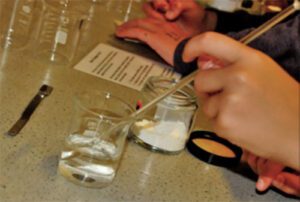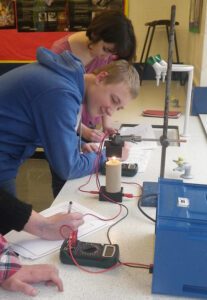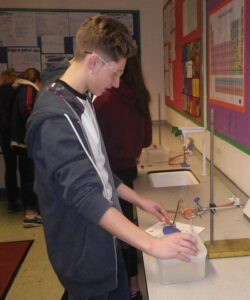SEPARATE SCIENCES (3 GCSEs, Biology, Chemistry and Physics)
If Separate Sciences has been chosen as an option students will study the content of the Combined Science course as well as further or extended topics in the three Science subjects.
Topics covered in Separate Sciences are externally assessed by two examinations at the end of Y11, each paper being 1hr 45mins in length and out of 100 marks. The topic areas covered by the papers are shown below:
Biology Paper 1 Topic 1 – Key concepts in biology, Topic 2 – Cells and control, Topic 3 – Genetics, Topic 4 – Natural selection and genetic modification, Topic 5 – Health, disease and the development of medicines.
Biology Paper 2 Topic 1 – Key concepts in biology, Topic 6 – Plant structures and their functions, Topic 7 – Animal coordination, control and homeostasis, Topic 8 – Exchange and transport in animals, Topic 9 – Ecosystems and material cycles.
Chemistry Paper 1 Topic 1 – Key concepts in chemistry, Topic 2 – States of matter and mixtures, Topic 3 – Chemical changes, Topic 4 – Extracting metals and equilibria, Topic 5 – Separate chemistry 1.
Chemistry Paper 2 Topic 1 – Key concepts in chemistry, Topic 6 – Groups in the periodic table, Topic 7 – Rates of reaction and energy changes, Topic 8 – Fuels and Earth science, Topic 9 – Separate chemistry 2.
Physics Paper 1 Topic 1 – Key concepts of physics, Topic 2 – Motion and forces, Topic 3 – Conservation of energy, Topic 4 – Waves, Topic 5 – Light and the electromagnetic spectrum, Topic 6 – Radioactivity, Topic 7 – Astronomy.
Physics Paper 2 Topic 1 – Key concepts of physics, Topic 8 – Energy – Forces doing work, Topic 9 – Forces and their effects, Topic 10 – Electricity and circuits, Topic 11 – Static electricity, Topic 12 – Magnetism and the motor effect, Topic 13 – Electromagnetic induction, Topic 14 – Particle model, Topic 15 – Forces and matter.
There is no separately assessed coursework but students are expected to gain a good knowledge of the process of ‘Working Scientifically’ through a number of “core practicals” that will be assessed as part of the examinations along with mathematical skills.
These are a key part of the course with 8 per subject specified by Edexcel. Over the two years students will be given the opportunity to complete these practicals and make detailed notes on them for future revision.
There is also an increased emphasis on mathematical skills in the new courses. There are different weightings for maths within the exams, Biology 10%, Chemistry 20% and Physics 30%. The main difference being that for the Physics exams students are expected to learn and be able to recall 19 key equations. They will have to know these equations to be able to answer up to 20% of the questions in the exam paper.
Specification Codes
Examination Board: Edexcel
Combined Science 1SC0
Biology 1BI0
Chemistry 1CH0
Physics 1PH0
Years 12 to 13 – Sixth Form
A Level Biology
Examination Board: OCR
“This course has been challenging, very interesting and hard work. I have enjoyed it and feel proud to have achieved such good grades in the assessments and mock exams so far”
– A Year 12 Biology student
Within modules you will study a wide range of biological concepts that build directly upon your GCSE Science. It is strongly advised that you have at least grade 6 in higher tier maths.
Throughout the course you will develop a range of practical skills which are integrated within the topics and are assessed through written examinations. The internally assessed Practical Endorsement skills form part of the full A Level Biology. You will complete a minimum of 12 assessed experiments covering technical skills together with the use of apparatus and practical techniques. You will also gain an awareness of the environmental, technological, ethical and economic aspects of Biology.
Module 1 – Development of Practical Skills in Biology
Practical skills assessed in the written examinations
Practical Endorsement skills
Module 2 – Foundations in Biology
Cell structure; Biological molecules; Nucleotides and nucleic acids; Enzymes; Biological membranes; Cell division, cell diversity and cellular organisation
Module 3 – Exchange and Transport
Exchange surfaces; Transport in animals; Transport in plants
Module 4 – Biodiversity, Evolution and Disease
Communicable diseases, disease prevention and the immune system; Biodiversity; Classification and evolution
Module 5 – Communication, homeostasis and energy
Communication and homeostasis; Excretion as an example of homeostatic control; Neuronal communication; Hormonal communication; Plant and animal responses; Photosynthesis; Respiration
Module 6 – Genetics, evolution and ecosystems
Cellular control; Patterns of inheritance; Manipulating genomes; Cloning and biotechnology. Ecosystems; Populations and sustainability.
A2 Assessment: both components must be completed
(01) Biological Processes – 37% of total A level 2 hour 15 minutes written examination paper (100 marks)
(02) Biological Diversity – 37% of total A level 2 hour 15 minutes written examination paper (100 marks)
(03) Unified Biology – 26% of total A level 1 hour 30 minutes written examination paper (70 marks)
(04) Practical Endorsement in Biology – reported separately TBC
Course specification link http://www.ocr.org.uk/qualifications/as-alevel-gce-biology-a-h020-h420-from-2015/
Are you interested in:
• The human body
• The secret life of plants
• Cutting edge developments
• Current research
• Environmental issues and building ethical arguments
Leading to a career in:
• Health and medical related occupations
• Animal related occupations
• Environmental work
• Forensics
• Conservation
• Biochemistry
• Microbiology
• Agriculture
• Genetic Engineering
“Biology is the study of life itself; what life on planet Earth has been, is now and could be under our ever-increasing influence”.
A Level Chemistry
Examination Board: OCR (www.ocr.org.uk – for further details)
‘Chemistry lies at the heart of everything. It is the study of the structure, properties and synthesis of matter. Nothing exists without Chemistry!’ – A Year 12 Chemistry student
A Level Chemistry A (H432)
Within modules you will study a wide range of chemical concepts that build directly on your GCSE Science.
Throughout the course you will develop a range of practical skills which are integrated within the topics and are assessed through written examinations. The internally assessed Practical Endorsement skills form part of the full A Level Chemistry. You will complete a minimum of 12 assessed experiments covering technical skills together with the use of apparatus and practical techniques. You will also gain an awareness of the environmental, technological, ethical and economic aspects of Chemistry.
Module 1 – Development of practical skills in Chemistry
Practical skills assessed in the written examinations. Practical Endorsement skills
Module 2 – Foundations in chemistry
Atoms, compounds, molecules and equations; Amount of substance; Acid– base and redox reactions; Electrons, bonding and structure
Module 3 – Periodic table and energy
The periodic table and periodicity; Group 2 and the halogens; Qualitative analysis; Enthalpy changes; Reaction rates and equilibrium (qualitative)
Module 4 – Core organic chemistry
Basic concepts; Hydrocarbons; Alcohols and haloalkanes; Organic synthesis; Analytical techniques (IR and MS)
Module 5 – Physical chemistry and transition elements
Reaction rates and equilibrium (quantitative); pH and buffers; Enthalpy, entropy and free energy; Redox and electrode potentials; Transition elements
Module 6 – Organic chemistry and analysis
Aromatic compounds; Carbonyl compounds; Carboxylic acids and esters; Nitrogen compounds; Polymers; Organic synthesis; Chromatography & spectroscopy (NMR)
A Level Chemistry provides a firm foundation for you to progress to study Chemistry at further or higher education or to follow courses in related subjects e.g. medicine, biochemistry, veterinary science, forensic science, engineering, dentistry, physiotherapy, sports science, oceanography, environmental sciences.
A2 Assessment: both components must be completed
(01) Periodic Table, elements and physical chemistry – 37% of total A level 2 hour 15 minutes written examination paper (100 marks)
(02) Synthesis and Analytical techniques – 37% of total A level 2 hour 15 minutes written examination paper (100 marks)
(03) Unified Chemistry – 26% of total A level 1 hour 30 minutes written examination paper (70 marks)
(04) Practical Endorsement in ChemistryTBC Course specification link http://www.ocr.org.uk/qualifications/as-alevel-gce-chemistry-a-h032-h432-from-2015/
Are you interested in:
- Practical Chemistry
- Chemical Applications
- Patterns & Trends in Data
- Problem Solving
- Chemical Research
- Cutting Edge Science
Leading to a career in:
- Chemistry
- Engineering
- Biochemistry
- Biosciences
- Medical occupations
- Veterinary Sciences
- Geosciences
- Pharmacy
- Dentistry
- Law
- and many, many more …
“Chemistry is so interesting …. like a language of its own. Its beauty…. it means something you couldn’t say in English. It’s happening all around us all of the time without us realising”
A Level Physics
Examination Board: OCR (www.ocr.org.uk – for further details)
Physics is a subject that asks the fundamental questions about how the world works. How do matter and forces interact in all situations. Mysteries from the very small to the very large.
A Level Physics A (H556)
Within modules you will study a wide range of Physics concepts that build directly on your GCSE Science.
Throughout the course you will develop a range of practical skills which are integrated within the topics and are assessed through written examinations. The internally assessed Practical
Endorsement skills form part of the full A Level Physics. You will complete a minimum of 12 assessed experiments covering technical skills together with the use of apparatus and practical techniques. You will also gain an awareness of the environmental, technological, ethical and economic aspects of Physics.
As the A level course is now linear for the full A level qualification all 6 modules are covered by examinations at the end of Year 13.
The Modules
Module 1 – Development of practical skills in Physics
Practical skills assessed in the written examinations (A Level and AS) Practical Endorsement skills (A Level only)
Module 2 – Foundations in Physics
Physical quantities and units; Making measurements and analysing data; Nature of quantities
Module 3 – Forces and motion
Motion; Forces in action; Work, energy and power; Materials; Newton’s laws of motion and momentum
Module 4 – Electrons, Waves and Photons
Charge and Current; Energy, Power and Resistance; Electrical Circuits, Waves, Quantum Physics
Module 5 – Newtonian World and Astrophysics
Thermal Physics; Circular motion; Oscillations; Gravitational fields; Astrophysics and cosmology
Module 6 – Particles and medical physics
Capacitors; Electric fields; Electromagnetism; Nuclear and particle physics; Medical imaging
A Level Physics provides a firm foundation for you to progress to study Physics at further or higher education or to follow courses in related subjects e.g. medicine, biophysics, engineering, dentistry, architecture, astrophysics.
A2 Assessment
All components must be completed, all examined at the end of Y13
(01) Modelling Physics – 37% of total A level 2 hour 15 minutes written examination paper (100 marks)
(02) Exploring Physics – 37% of total A level 2 hour 15 minutes written examination paper (100 marks)
(03) Unified Physics – 26% of total A level 1 hour 30 minutes written examination paper (70 marks)
Practical skills
(04) Practical Endorsement in Physics
Course specification link http://www.ocr.org.uk/qualifications/as-alevel-gce-physics-a-h156-h556-from-2015/
Are you interested in:
- Strategic thinking
- Solving problems
- Science
- Underlying patterns in the physical world
Leading to a career in:
- Engineering
- Medicine
- Computing
- Physics
- Financial Services
- Law
“I chose Physics as I was intrigued at the mechanisms in life. I also enjoy working through the mathematical principles behind it”. – A Y13 student





